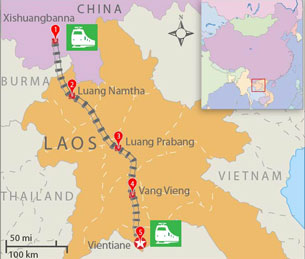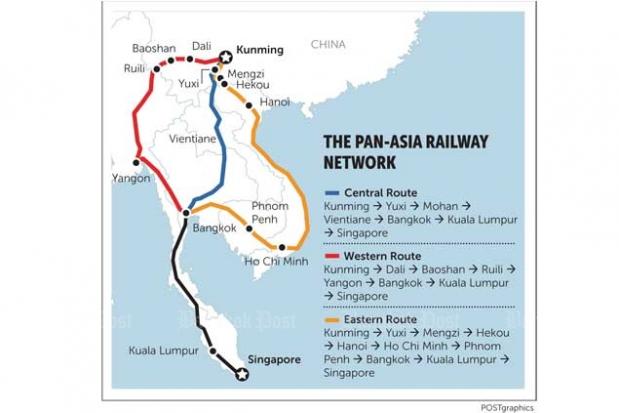Conveying of Chinese Hegemony?
by Patrick Huang
語言:
English
Photo Credit: Xinhua/Huang Jingwen
COLONIALISM is to expand territories and as a rule strategic military is part of this process. Neocolonialism is different, many a time this suggests economic intervention without the direct use of the military. I would like to argue that the PRC has its eyes set on colonizing Thailand using this stratagem with future plans to build a Sino-Thai railroad. I will justify the argument by posing a comparative study to the Laos case, looking at the infrastructure development projects in Laos as precedent for what may happen in Thailand in the future.
Laos’ economic growth is deemed pessimistic in outlook and conditions of uneven development in the country itself necessitate a number of infrastructure development projects. Laos claims to be a radical-socialist country whose political philosophy stays congruent with that of China’s own claim to be socialist. As such, the Lao government take China as a crucial strategic partner. Mr. Achong Laomao, the Deputy Director of the Investment Promotion, Ministry of Planning and Investment, has for example prevailed on Chinese entrepreneurs who participated in the Laos-China Business Forum to liaise with the Lao government to build the infrastructure, including railways, hydropower, power gird and agricultural production.
 The proposed railway running through Laos, would connect also to Thailand and China. Photo credit: RFA
The proposed railway running through Laos, would connect also to Thailand and China. Photo credit: RFA
Three main players gaining ground in Laos are China, Vietnam and Thailand, of which China remains the most influential when it comes to investment. Guan Huabing, Beijing’s ambassador to Laos, declared China’s cumulative investment in Laos stands at $5.1 billion, edging Thailand and Vietnam out, as reported by Adam Pasick in Quartz. Reuters has further reported that the railway, to be 70 percent funded by China and 30 percent by Laos and will eventually be connected with railroads to countries such as Thailand and Malaysia.
This contribution is never gratis. It comes at the price of leverage, economic or political. In a recent trip to Laos, I noticed that the emblem of China has become ubiquitous, e.g., banners of Huawei, a Chinese telecommunication company, which can be seen in Vientiane. So pervasive is it that I feel Laos is losing cultural singularity as bound up sacrificing state sovereignty to China. Ken Quimbach argues similarly in an editorial published, surprisingly enough, by state-run Global Times, Chinese incursions into Laos’ economics, commerce planning, and resource management are now so pervasive and entrenched, that they can never be reversed.
 Map of the planned Sino-Thai railway. Photo credit: Bangkok Post
Map of the planned Sino-Thai railway. Photo credit: Bangkok Post
Based on my prior knowledge and observation, I argue that China’s claim to lend a helping hand to Thailand with the planned Sino-Thai railroad may be at cost of our sovereignty as well. Apparently China has played a significant role over Thailand since the military coup of 2014. As the U.S.-Thailand relation is exacerbated by the coup, the Chinese government has supported and helped consolidate the military government led by General Prayut. For example, China’s Defence Minister Chang Wanquan visited Thailand. Meeting with his Thai colleague, Defence Minister Prawit Wongsuwon, the Chinese minister expressed an interest in working with Thailand while respecting the latter’s sovereignty in all theoretical and practical spheres.
Chinese promises to respect Thailand’s sovereignty sound suspect. Regarding the Sino-Thai railway project, Arkhom Termpittayapaisith, the Thai transport minister, has stated that China has requested more benefits such as owner rights on land surrounding the stations and other non-rail operational revenue, like it did with Laos.
This validates the theory of neocolonialism through economic assistance, though here, we see not merely economic encroachment but also pursuit of territorial ownership. Intriguingly enough, the Thai government seems happy having China as a friend in need. At times, the Thai government has been willing to gratify Chinese government to the extent that they willingly or unknowingly give up the principles of human rights. For instance, last year Uyghurs were controversially repatriated to China. This is not to mention the recent case of Hong Kong bookseller Gui Minhai, who was abducted in Thailand. This evokes a picture of the colonized Thailand and the colonizer China. To reiterate, the current state of being colonized is accomplished through the claim assistance. Chinese encroachment upon Thai sovereignty will grow higher should the Sino-Thai railway project be achieved.


 The proposed railway running through Laos, would connect also to Thailand and China. Photo credit: RFA
The proposed railway running through Laos, would connect also to Thailand and China. Photo credit: RFA Map of the planned Sino-Thai railway. Photo credit: Bangkok Post
Map of the planned Sino-Thai railway. Photo credit: Bangkok Post